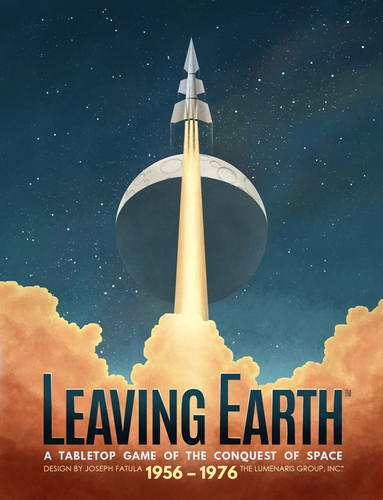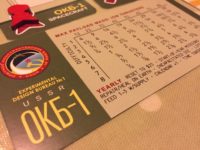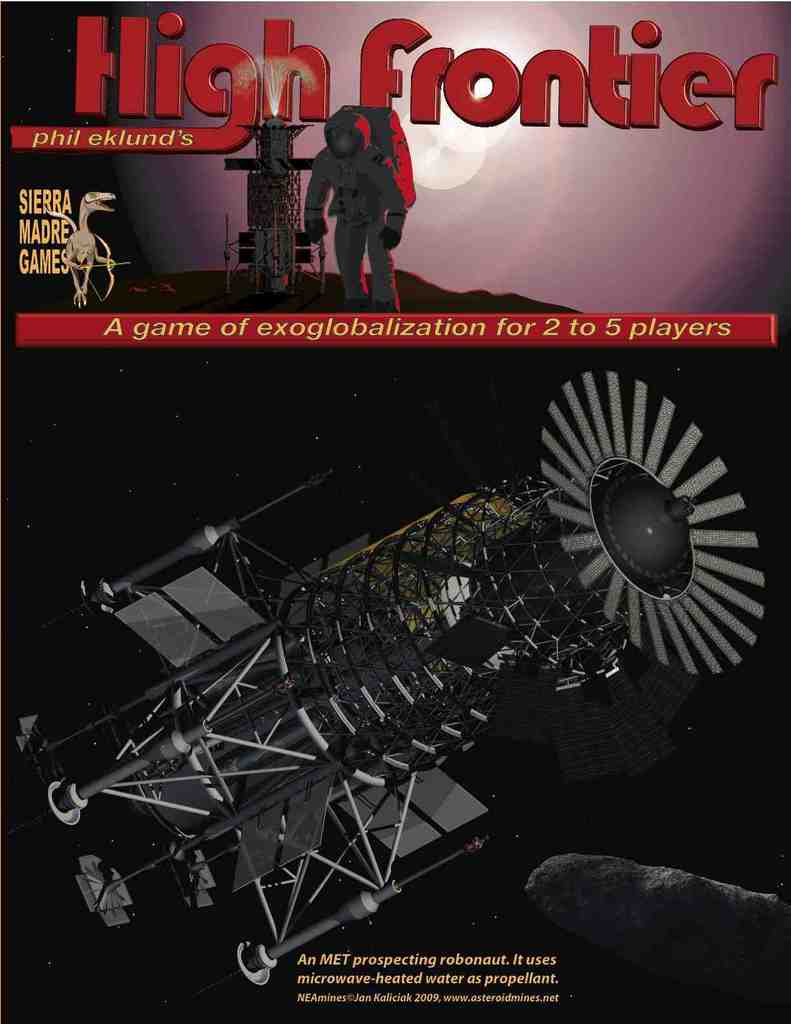- Learning time
- 60 minutes
- First play time
- 180 minutes
Leaving Earth
Designed by:
In Leaving Earth players represent space agencies racing to get their spacecraft (and astronauts) into space, in order to score propaganda victories (i.e. points!) for their respective governments.
The ‘board’ is actually several cards laid out, to show the area your rockets can travel to. The game takes place over 21 rounds, representing each year from 1956 to 1976. Players take on the identity of a space agency from the Soviet Union, USA, France, China or Japan. At the start of each round your government gives you $25m to spend, and then each player takes as many turns as they like before their money is used up.
So, what do you spend money on? You can train astronauts, develop technology, build probes and rockets to power them. Actually launching them doesn’t require any money, but this is where the game’s key economy comes in: thrust. Every ship weighs something, so you have to calculate the weight of your ship, check the board for the difficulty of the route, and then multiply those two figures together to give you your required thrust. If you don’t have enough, you can buy more rockets and add them to your ship. But: now your ship weighs more, so you need to recalculate your thrust…
When you have the desired thrust, your launch can still go wrong though. Each technological advance comes with Outcome cards that define the success, or lack of it, for that particular tech. You may have to reveal one, or more, and they contain three possible outcomes: success, minor failure or major failure. Having done so, you shuffle them back into a pile – unless you have the money and inclination to get rid of cards. It’s worth even getting rid of a success card, because you can’t guarantee it will come out ahead of a failure card next time, and once your tech has shed all of its Outcome cards, every use is a guaranteed success.
Then there’s the problem of space travel. You need the tech to land, to rendezvous with other craft, to keep the life support working, and supplies to keep your astronauts alive… there’s quite a bit going on here, and we’ve tried to cover the basics. The game ends either after the 1976 round, or when one player gathers so many points as to be uncatchable.
The guru's verdict
-
Take That!
Take That!
None from the other players, but plenty from the game. Actually Leaving Earth specifies that players can choose to help each other, sharing technological advances or giving each other lifts in space.
-
Fidget Factor!
Fidget Factor!
Potentially high, albeit not for chess-like periods of silence. Players will need to work out their best options on a launch or mission into space, but unless you are uber-competitive, it doesn't change the game much to help each other with the maths here.
-
Brain Burn!
Brain Burn!
High. The game is all about forward planning, and there's a good deal of calculus involved.
-
Again Again!
Again Again!
There's much variety to be had: you can vary the objectives (which come in decks of Easy, Medium and Hard) and the 'board' itself has random elements in set-up: locations such as the Moon, Mars and Venus will vary in how hostile or welcoming they are game by game, as one card is dealt from a possible four in each case. There's also the luck of the draw with the Outcome cards...















Sam says
The artwork - I think - is gorgeous, and evocative of the time. The play is dripping with theme, and I love the fact you can play with an element of co-operation, as well as competition. Ultimately you can't help rooting for someone to safely return their astronauts to Earth, even if it means you're going to lose the game. But - this is dripping with something else too: calculation. You are not a pioneering heroic astronaut. You're a number-cruncher, crouched over some ancient computer back at the base, trying to keep the team out their in space alive - which, very often, you're doing in vain. So the success of game really depends how much you like that kind of challenge, or whether the theme - the logistical struggle of the space race, rather than the derring-do - rises above game mechanics that are essentially mathematical, albeit laced with chance. For the right group, this is a home run. For the wrong one, it's merely homework.